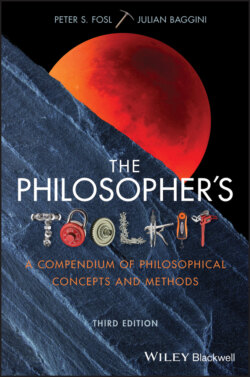Читать книгу The Philosopher's Toolkit - Julian Baggini, Julian Baggini - Страница 29
A misleading similarity
ОглавлениеBecause of the general similarity one sees between these two arguments, inductive arguments can sometimes be confused with deductive arguments. That is, although they may actually look like deductive arguments, some arguments are actually inductive. For example, an argument that the sun will rise tomorrow might be presented in a way that can easily be taken for a deductive argument:
1 The sun rises every day.
2 Tomorrow is a day.
3 Therefore, the sun will rise tomorrow.
Because of its similarity with deductive forms, one may be tempted to read the first premise as an ‘all’ sentence:
The sun rises on all days (every 24‐hour period) that there ever have been and ever will be.
The limitations of human experience, however (the fact that we can’t experience every single day), justify us in forming only the less strong ‘some’ sentence:
The sun has risen on every day (every 24‐hour period) that humans have recorded their experience of such things.
This weaker formulation, of course, enters only the limited claim that the sun has risen on a small portion of the total number of days that have ever been and ever will be; it makes no claim at all about the rest.
But here’s the catch. From this weaker ‘some’ sentence, one cannot construct a well‐formed deductive argument of the kind that allows the conclusion to follow with the kind of certainty characteristic of deduction. In reasoning about matters of fact, one would like to reach conclusions with the certainty of deduction. Unfortunately, induction will not allow it. There’s also another more complex problem lurking here that’s perplexed philosophers: induction seems viciously circular. It seems in fact to assume the very thing it’s trying to prove. Consider the following.
